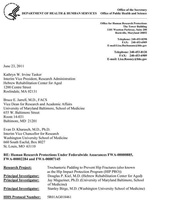UPDATED: Oct. 11, 2012, at 1:31 p.m.
A Harvard professor’s study, which has come under fire amid accusations that he inadequately informed participants that the testing could put them in danger, led the Journal of the American Medical Association to issue an “expression of concern” for the first time ever.
The note, published online last week by editor-in-chief Howard C. Bauchner and executive deputy editor Phil B. Fontanarosa, concerned a study by Harvard Medical School gerontologist Douglas P. Kiel on the effectiveness of padded underwear in preventing hip fractures among the elderly.
Since the journal published the study in 2007, the U.S. Office of Human Research Protection has issued a report accusing Kiel of failing to properly tell participants about the potential risks associated with the study.
“We concur with the OHRP determination that the failure to notify research participants about potential risks they may have experienced by participating in the study represents serious concerns regarding their protection as research participants in this study,” Bauchner and Fontanarosa wrote in their editorial.
As a member of the research staff at Hebrew SeniorLife, an affiliate of Harvard Medical School that focuses on geriatrics, Kiel concluding that padded underwear was not effective at preventing hip fractures during falls. Participants in his study wore underwear with pads on one side only.
During the experiment, called HIP PRO, researchers found that these seniors may be more likely to fall on the padded side than the unpadded side, a pattern that they suspected developed because the uneven padding caused them to walk with an unbalanced gait. The OHRP found that participants were not informed of this potential risk when they signed up for the study, violating Department of Health and Human Services regulations regarding ethical research.
Kiel declined to comment on the recent editorial.
Despite the suspected problems with the research, JAMA re-affirmed the results of the study.
“There was no evidence provided that raised concerns about the scientific integrity of the data and the veracity of the study conclusions; therefore, we are taking no further action at this time,” Bauchner and Fontanarosa wrote in the editorial.
Hebrew SeniorLife is not aware of any participant who was harmed because of a fall due to the hip pad, according to Rachel J. Whitehouse, a spokesperson for Hebrew SeniorLife.
“We appreciate that the JAMA editors upheld the data integrity and veracity of the study conclusions,” she said.
Edward L. Goodwin, the founder and president of HipSaver, a company which produces padded underwear, said that the “expression of concern” did not go far enough in addressing potential flaws in the study. “The latest editorial is whitewash,” said Goodwin, who sued Kiel in 2008 for commercial disparagement, arguing that Kiel’s study improperly cast aspersions on all padded underwear.
“Numerous data sets reveal that there is a flaw in this study and they failed to disclose it to whom they should. JAMA has just sidestepped this issue,” said Goodwin, who first raised the issue of the suspected risks of the study to the government in 2009.
In July 2011, the OHRP approached Hebrew SeniorLife with their accusations, prompting a corrective action plan that was approved by the government a year later.
“Protecting the people who participate in our studies is our ultimate concern, so we used the HIP PRO matter as an opportunity to examine and improve all of Hebrew SeniorLife’s systems for human subject protection,” Whitehouse said. “We have now strengthened our Institutional Review Board, the training of our researchers, and our other human subject protection processes.”
Read more in News
Former Professor Accused of Swindling Harvard HopefulsRecommended Articles
-
Fifteen Minutes: Editor's Note: Shoot MeOur beds haven't been made in over a week. A trail from the bedroom to the bathroom tells the story
-
Fashion Mitzvah*T here are naked people at Harvard and they're not just posing for a figuredrawing class. "Oh, "you may scoff,
-
A State of DetergencyDoing laundry is a tiresome business. Weekly, I lug piles of dirty clothing down the stairs to Weld basement, greeted
-
HMS Prof Faces Suit Over ArticleHarvard Medical School professor Douglas P. Kiel is facing a lawsuit because of an article he published in the July
-
 Quincy Residents Receive a Load of Crap
Quincy Residents Receive a Load of Crap -
 Government Accuses Team Led by Harvard Professor of Ethics Violations
Government Accuses Team Led by Harvard Professor of Ethics Violations













